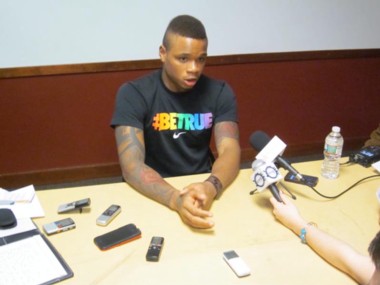Derrick Gordon sat behind a table in the corner of a room in the basement of the Mullins Center, fielding (to mix a sports metaphor) questions. At a table 10 feet from Gordon, his former roommate Tyler Bergantino chatted with reporters. Across the room, UMass athletic director John McCutcheon surveyed the room before stepping out.
Men’s basketball coach Derek Kellogg took turns standing and then sitting at yet another table, talking to a steady stream of reporters, all of who were there because of Gordon. Behind Kellogg stood UMass professor emeritus Pat Griffin.
Earlier that morning, in articles with video interviews posted at both Outsports and ESPNW, sophomore UMass guard Gordon had come out, becoming the first openly gay male basketball player in a major Division 1 program.
The impact of the announcement was immediate, with outlets from Sports Illustrated to ABC News to The Huffington Post picking up the story. Sitting at the table with Gordon, one reporter told him he was trending on Twitter. He responded by saying he heard he was on the news in Israel.
“I didn’t want to be the first [male basketball player to come out],” he told me. “But I’m comfortable and confident about it.”
Gordon transferred from Western Kentucky to UMass two years ago After sitting out the first year—as per NCAA rules regarding transfers—he played his first season on the court for the Minutemen this past year.
“I could have been anywhere and come out, but I just happen to be in Massachusetts, which is great,” Gordon said, noting the state’s equal marriage law and accepting culture of both UMass and the Valley.
Jason Collins. Brittany Griner. Michael Sam. Now Derrick Gordon. And that’s this past year alone.
The news of American athletes publicly declaring their homosexuality may not be as unheard of as it once was, but it’s still notable. There’s still a stigma—albeit a diminishing one—attached to being a gay athlete. Our society has yet to figure out what a sports culture looks like that is so accepting of its athletes that the act of publicly coming out is no longer needed.
“We’re writing the playbook for this,” Griffin tells me as we stand across the room from Gordon, occasionally glancing in his direction.
“I’m really proud of UMass,” she adds. “The entire athletic department, from McCutcheon on down, has been amazing.”
But while the support of McCutcheon, Kellogg and others in the UMass athletics community is vital to the immediate and the long-term success of Gordon—who still has two full seasons of eligibility left—it is the presence of Griffin, whom UMass officially honored last fall for her work as an LGBT advocate, that is most telling.
The author of Strong Women, Deep Closets: Lesbians and Homophobia in Sports, Griffin came to UMass in pursuit of an advanced degree in sports studies, receiving her doctorate in education in 1980. As coach of the women’s swim team, she “became sort of the underground lesbian coach student athletes could talk to,” Griffin told the Advocate last year (see “Grandma of the Movement: Longtime Valley educator and activist Pat Griffin is a pioneer of LGBTQ sports equality,” May 4, 2013). “I hated it that they were struggling so much and so closeted themselves,” she recalled. “It really motivated me to work to change sports.” Later she helped create the university’s social justice education program, for which she co-edited Teaching for Diversity and Social Justice: A Sourcebook for Teachers and Trainers.
Off campus, Griffin served director of the Women’s Sport Foundation initiative It Takes A Team! Education Campaign for Lesbian, Gay, Bisexual and Transgender (LGBT) Issues in Sport, and as the founding director of the Gay Lesbian and Straight Education Network’s (GLSEN) sports-centered organization Changing the Game.
At Changing the Game, she worked regularly with Outsports founder Cyd Ziegler, to whom Gordon gave his interview last week, as well as Oakland A’s general manager Billy Bean, former NFL cornerback and current You Can Play Project executive director Wade Davis, and NHL scout Patrick Burke, co-founder of the You Can Play Project.
Davis, Bean and Burke were all directly involved in helping Gordon with his process of publicly coming out.
“If it wasn’t for them, I wouldn’t be able to do what I’m doing,” Gordon said of his conversations with Bean, Collins and Davis. “They said, ‘If you’re not ready, don’t rush it.’”
Pausing to wait for the next question, Gordon glanced over in Griffin’s direction, smiled and nodded. Griffin responded with a quick wave.
Davis was his initial contact, Griffin told me. Gordon then connected with high school basketball coach Anthony Nicodemo, and talked with Collins.
As he got to know other gay members of the athletic community—all of whom had already gone through the process of coming out—Gordon got more comfortable with the idea. Griffin helped connect the UMass athletic department to Burke, Davis, Ziegler and Kate Fagan, who interviewed Gordon for ESPN.
“He got excited to live his truth,” Griffin says. “He was ready for this.”
Sitting at the table with Gordon, I asked him about the potential of seeing a gay pride flag in the stands at the Mullins Center this upcoming season. He smiled immediately and paused for a moment, seeming to enjoy the thought.
“That would be amazing,” he says. “But then I’m going to still have to worry about winning the game.”•



